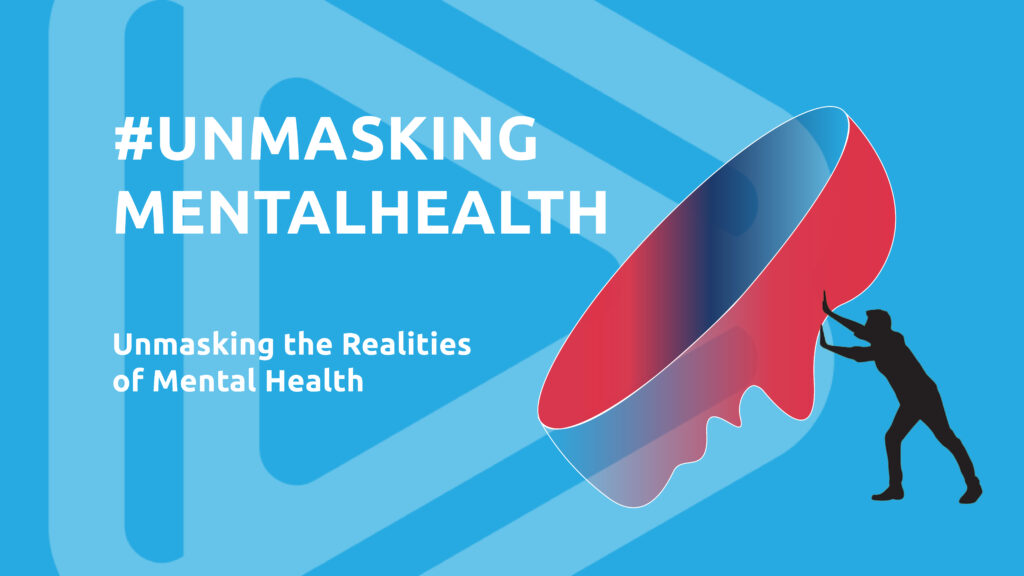
Mental health. It’s a part of all of us, yet it’s often shrouded in silence, misconceptions, and stigma. This Canadian Mental Health Month, MCSnet believes it’s time to unmask the realities of mental health, to bring conversations into the open, and to ensure you know you are not alone and that support is available.
The truth is, mental health challenges are common. They don’t discriminate based on age, background, or where you live in our vibrant rural communities. Feelings of anxiety, stress, sadness, or overwhelming pressure are experiences many face. Sometimes these feelings are temporary, but for others, they can become persistent and significantly impact daily life.
Let’s break down some of the realities:
Mental Health is a Spectrum
Just like physical health, mental well-being exists on a continuum. We all have times when we feel good and times when we struggle. It’s not about being “sick” or “healthy,” but rather about recognizing where you are on that spectrum and taking steps to support your well-being.
Stigma Prevents People From Seeking Help
Fear of judgment, shame, or being misunderstood can be a significant barrier to reaching out. This is why open conversations and a supportive community are so vital. Let’s commit to creating a space where talking about mental health is as natural as talking about a physical ailment.
Early Intervention is Key
Just as with physical health concerns, addressing mental health challenges early can lead to better outcomes. Recognizing the signs and seeking support promptly can make a significant difference in a person’s journey to recovery and well-being.
Recovery is Possible
It’s crucial to remember that with the right support, resources, and self-care strategies, recovery from mental health challenges is absolutely possible. Hope and healing are within reach.
Unmasking the Support Systems in Your Area
The good news is that within our communities, there are dedicated resources available to support your mental health journey. Let’s shine a light on some of them:
- Alberta Health Services (AHS) – Mental Health Services: AHS provides a wide array of mental health services across Alberta, including right here in our region. Don’t hesitate to reach out to their 24/7 help line at 1-877-303-2642 or explore their website at [Insert AHS Mental Health Services Website Link Here] to connect with professionals who can provide guidance and support tailored to your needs in East Central Alberta.
- Your Local Primary Care Networks (PCNs): Many PCNs have integrated mental health professionals into their teams. Connect with your family doctor or your local PCN to learn about the mental health support services they offer.
- Counselling Services in Your Community: From individual therapists to family counselling centres, various professionals in your specific town or county are dedicated to providing support. A local online search for “counselling services [your specific town/county]” will help you find these valuable resources.
- The Distress Line: For immediate and confidential support during moments of distress or crisis, the 24/7 Distress Line at 1-800-784-2433 is a vital lifeline for anyone in Alberta.
- Canadian Mental Health Association (CMHA) – Local Connections: Explore the CMHA Alberta website to see if there’s a local branch serving your area. They often offer community-based programs, support groups, and valuable information.
Taking Off the Mask Together
At MCSnet, we are more than just an internet service provider; we are a part of the fabric of Northeastern Alberta. We believe in fostering a community where everyone feels safe, supported, and empowered to prioritize their mental well-being. Let’s pledge to:
- Educate ourselves and others about mental health realities.
- Challenge stigma by speaking openly and with empathy.
- Reach out to support those who may be struggling.
- Prioritize our own mental health without shame.
By unmasking the realities of mental health and highlighting the accessible support systems in rural Alberta, we can collectively build a stronger, healthier, and more compassionate community.
Nurturing Your Well-being: Simple Tips for Positive Mental Health
In addition to knowing where to find support, incorporating healthy habits into your daily life can significantly boost your mental well-being. Here are a few simple yet powerful tips to consider:
- Connect with Others: Strong social connections are a cornerstone of good mental health. Make time for meaningful interactions with family, friends, and your community in East Central Alberta. Whether it’s a phone call, a walk in nature together, or participating in local events, nurturing these bonds can reduce feelings of loneliness and provide a sense of belonging.
- Stay Active: Physical activity isn’t just good for your body; it’s fantastic for your mind too! Find activities you enjoy, whether it’s hiking in the beautiful landscapes of Alberta, cycling, gardening, or simply taking a brisk walk around your neighbourhood in East Central Alberta. Exercise releases endorphins, which have mood-boosting effects.
- Practice Mindfulness: Take moments throughout your day to tune into the present. This could involve deep breathing exercises, meditation (even just for a few minutes), or simply paying attention to your senses – what you see, hear, smell, taste, and touch – right here in your East Central Alberta surroundings. Mindfulness can help reduce stress and increase self-awareness.
- Get Enough Sleep: Quality sleep is essential for both your physical and mental health. Aim for 7-9 hours of restful sleep each night. Establish a regular sleep schedule and create a relaxing bedtime routine to optimize your sleep.
- Eat Well: Nourishing your body with a balanced diet can also positively impact your mood and energy levels. Focus on whole foods, including fruits, vegetables, and whole grains.
- Learn Something New: Engaging your mind through learning can boost confidence and provide a sense of purpose. Consider taking up a new hobby, reading a book, or exploring online courses. East Central Alberta has many opportunities for lifelong learning and skill development.
- Set Realistic Goals: Having goals gives you something to work towards, but it’s important to set achievable ones. Break down larger goals into smaller, manageable steps to avoid feeling overwhelmed. Celebrate your progress along the way!
- Practice Gratitude: Regularly taking time to appreciate the good things in your life, no matter how small, can shift your focus towards positivity. Consider keeping a gratitude journal or simply reflecting on what you’re thankful for each day.
- Limit Exposure to Excessive News and Social Media: While staying informed is important, constantly consuming negative news or spending excessive time on social media can negatively impact your mental well-being. Set healthy boundaries and take breaks when needed.
- Seek Help When You Need It: Remember that it’s okay to not be okay, and reaching out for support is a sign of strength. Utilize the resources mentioned earlier if you’re struggling or simply need someone to talk to.
By incorporating these tips into your daily routine, you can proactively nurture your mental health and build greater resilience. Remember, taking care of your mind is an ongoing journey, and every small step you take makes a difference for yourself and our communities.


